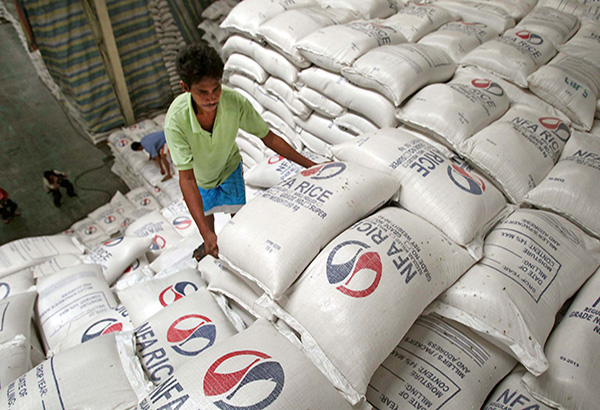NFA Council revamps rice importation program
June 13, 2017 | 10:55am

The question of whether or not to import rice has led to one undersecretary being fired. File photo
MANILA, Philippines — The National Food Authority’s top policymaking body has implemented comprehensive reforms in this year’s rice importation program, including placing caps on imports to ensure fair trade.
Cabinet Secretary Leoncio Evasco, who also sits as NFA Council chair, said the changes were meant to promote transparency and improve the efficiency of the importation program.
“We must protect our institutions by changing systems that are no longer working for the best interest of our poor consuming public,” Evasco said in a press briefing in Malacañang on Tuesday.
“We have to increase transparency in government procurement since this will promote public understanding and acceptance of government actions, which, in turn, will enhance the efficiency of this whole importation program,” he added.
The reforms came after President Rodrigo Duterte allowed the NFA to import rice from the private sector to augment its buffer stock for the lean months.
The decision was a policy shift from government to government (G2G) rice importation, which Evasco previously described as “prone to corruption.”
NFA administrator Jason Aquino had been pushing for G2G importation earlier this year. Halmen Valdez, and undersecretary in Evasco's office, was fired in April for pushing for allowing the private sector to import rice.
Evasco had appointed Valdez to perform complete staff work on his behalf in coordination with 12 other agencies, the supervisory power of which were transferred to the Office of the Cabinet Secretary pursuant to Executive Order 1.
“This means I was the extension of the Cabinet Secretary’s eyes and ears in ensuring that each of the heads of the agencies under his wing is performing his job to the best of his ability,” Valdez said after she was fired.
Delivery in tranches
For the private sector-led importation or the Minimum Access Volume (MAV) program, the NFA council agreed that the delivery shall arrive in tranches.
Under the new policy, at least 30 percent of the volume import quotas should arrive between August and September, while the remaining rice imports should arrive between December 17 and February 2018.
Evasco said that as of June 7, household and commercial stocks are in comfortable status, with household stocks at 44 days and with commercial stocks at 28 days.
“With the opening of this year’s MAV, the commercial stocks will further be augmented. And in order to avoid oversupply and in anticipation of the harvest season, the council has decided to let private sector importation arrive in tranches,” he said.
NFA is now required to immediately sign and release import permits within one day upon the endorsement of its Grains Marketing Operations Division.
“Please note that here, the NFA administrator’s duty is purely ministerial or mandatory,” Evasco said.
The release of certificates of eligibility for rice importation has been reduced to two days from 15 days.
The NFA Council also adopted a schedule of activities for the rice imports.
Under the Government to Private (G2P) importation scheme, the NFA Council shall divide the 250,000 metric tons import authority into several tranches of arrival and will be putting a cap on each lot, “to ensure competition and fair trade.”
Evasco said the council is looking at dividing the importation to eight to ten lots with minimum of 25,000 metric tons and maximum of 50,000 metric tons per lot.
“This year’s government to private importation seeks to do away with the old G2G that lacks transparency and competition,” the he said.
Evasco urged potential participating countries and international companies to support the reforms implemented by the NFA Council.
Other reform measures
The council also implement the following changes:
- The terms of payment that lasted for 365 days has been reduced to 15 days. Evasco said only big time players can afford to wait 365 days.
- The members of the bids and awards committee will be selected and approved by the council. Representatives from the Development Bank of the Philippines and farmers groups will also be designated as observers in meetings.
- The delivery period of the G2P importation shall arrive in tranches from July 31 until the last week of September.
- Subic Freeport Zone was removed as port of entry for G2P but Evasco did not say why the council made the decision. Zamboanga City will serve as port of entry in lieu of Subic.
- Only the total cost is required for the bidders to bid out. Evasco said other expenses like cost of freight, logistics and insurance will no longer be revealed “since these details are considered as trade secret.” He said revealing such information would “give unscrupulous traders and government officials an idea on which costs to pad or adjust.”
- Provisions disqualifying suppliers with pending liabilities before this year were removed so that many bidders can participate. Evasco said the NFA should continue to demand collection and file the appropriate legal cases
The council also ordered the NFA to come up with a terms of reference for all its regional bids and award committees on cargo handling for the domestic movement and transport of rice.
“With these changes being in place, the council is confident that it is being faithful to its foremost duty, that amid the lean season, it is able to secure fair pricing and affordable yet quality rice for every Filipino household,” Evasco said.
BrandSpace Articles
<
>
Philstar
x
- Latest
Latest
Latest
February 17, 2024 - 2:31pm
February 17, 2024 - 2:31pm
February 13, 2024 - 7:24pm
By Gaea Katreena Cabico | February 13, 2024 - 7:24pm
February 13, 2024 - 7:17pm
By Ian Laqui | February 13, 2024 - 7:17pm
January 30, 2024 - 4:25pm
By Ian Laqui | January 30, 2024 - 4:25pm
January 16, 2024 - 5:55pm
January 16, 2024 - 5:55pm
October 16, 2023 - 10:55am
October 16, 2023 - 10:55am
Recommended
























